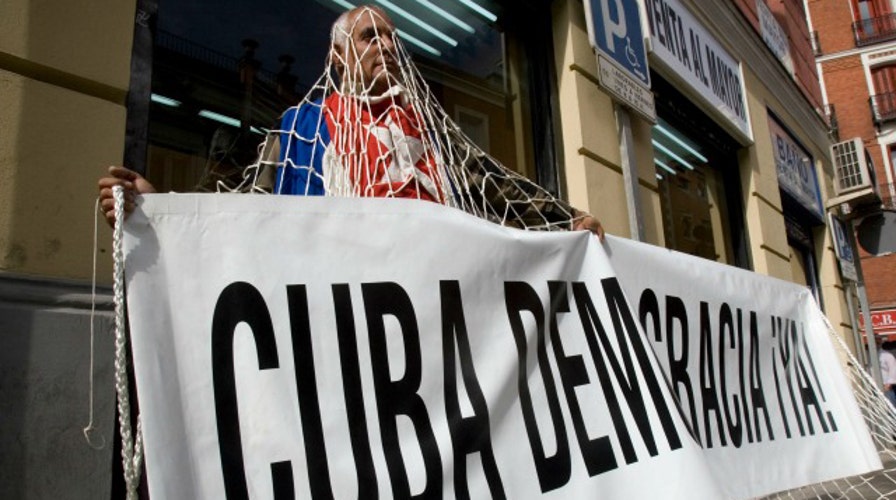This is a rush transcript from "Special Report," January 5, 2015. This copy may not be in its final form and may be updated.
(BEGIN VIDEO CLIP)
EARNEST: It's my understanding not all of them have been released at this point. But as part of the agreement that was brokered, this prisoner release that the Cuban government decided to undertake on their own in the context of these discussions, would take place in stages.
(END VIDEO CLIP)
BRET BAIER, ANCHOR: In stages. The 53 political prisoners were said to be released from Cuban jails as part of this deal and that some already had been. That was the word when the whole shift in Cuban policy was announced by the president. But it is not clear that they have been or they will be. We are back with our panel. A.B., it seems just a little twisted here, this whole process.
A.B. STODDARD, ASSOCIATE EDITOR, "THE HILL": You know, you can argue about the policy. But let's say you are someone who agrees with this policy. What about this process? Why has President Obama and his team left out -- maybe some cursory notification, but left out meaningful engagement with key dissident leaders in Cuba. The dissidents have now been locked up since this exchange was announced. Why do we not know who is on the list of the 53? Why -- if you leave out critical voices, you are going to be left holding the bag if this ends up having an adverse outcome.
My argument with the administration about this kind of thing is that they do themselves such a disservice literally becoming sort of the caricature of their critics, which is that they do everything for the stream of history in a bold headline but they don't do it right. From Guantanamo they did haven't a plan to close it. They just made the announcement. To creating a federal website for a national health care system. The Bowe Bergdahl exchange.
(CROSSTALK)
STODDARD: They didn't consult Congress. They didn't consult the men in his unit, and on and on. There's always this moment with chins on floor saying we just don't understand why it was done this way. And they do it to themselves.
BAIER: George?
GEORGE WILL, SYNDICATED COLUMNIST: You get mental whiplash trying to listen to these people. On the one hand the president, we just heard him say we brought these 53. Why 53? We were not told. We brought these 53 to the attention of the Cuban government. Then Earnest comes out and says something like the opposite. It wasn't clear what he was saying, but he seemed to be saying that the Cubans brought this up, it was voluntary on their part.
BAIER: And it wasn't tied to the -- I mean, it is very disjointed.
WILL: Exactly. So the question is, if the Ladies in White, the Cuban group that monitors these, tremendously brave people, don't know about this, then it hasn't happened. So why the White House is pretending that it's happened or won't tell us that it's happened or won't mention who they are, we pick the 53, supposedly. Why can't we have 53 names?
BAIER: Charles, is this shifting? The conventional wisdom is that this is such a great deal if you read all of the stories about it. Is it shifting?
CHARLES KRAUTHAMMER, SYNDICATED COLUMNIST: No. It was hollow from the very beginning. There is no real care in this administration for human rights abroad. Obviously, they have no great interest in these prisoners. It was a throw-in at the end of the deal. They had none for the revolution in Iran in 2009. They have none for Russia dissident who stand in the way of a deal with the Russians.
Look, the reason that Josh Earnest was pretending that this is a humanitarian, independent gesture on the part of the Castros is because we don't want to offend the Cubans into thinking it was somehow a deal. Why in god's name did we immediately release the three Cuban spies and not insist that there be an immediate release of the 53 Cubans? Why is it in stages? Here are people who are entirely innocent of a real crime other than opposing the regime. And we're releasing real criminals.
I think the worst part is what James Rosen reported. We are going to start negotiations in two weeks on normalization without insisting in advance that the prisoners are released. That's not a precondition? We are going to start and get absolutely nothing? It is impossible to believe the administration would be so weak and thoughtless in doing that. We will see. They have got two weeks to produce. I hope they do, but I'm worried that they won't.
BAIER: Quickly.
WILL: And this is going to affect something very big indeed, because as if is evidence that the president is an unreliable negotiator, Congress is going to take charge of the Iranian negotiations with their own sanctions and force that on the president's desk.
BAIER: This is going to be trouble on Capitol Hill.
STODDARD: Well, if those names do not come out before they are negotiating normalization, yes.
BAIER: That is it for the panel. But stay tuned for an example of pure excitement.
Content and Programming Copyright 2015 Fox News Network, LLC. ALL RIGHTS RESERVED. Copyright 2015 CQ-Roll Call, Inc. All materials herein are protected by United States copyright law and may not be reproduced, distributed, transmitted, displayed, published or broadcast without the prior written permission of CQ-Roll Call. You may not alter or remove any trademark, copyright or other notice from copies of the content.

